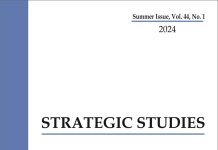Claudia Aradau, Jef Huysmans, Andrew Neal and Nadine Voelkner eds.,Critical Security Methods: New Frameworks for Analysis:(New York: Routledge, 2015), 214.
Ghazala Yasmin Jali
The book, Critical Security Methods: New Frameworks of Analysis tackles the issue of methods in Critical Security Studies (CSS). CSS differs from positivist approach in international relations and traditional security studies in many of its basic assumptions. Central to CSS is the assumption that security threats and insecurities are not simply objects ‘out there’ to be studies or problems to be solved. It has also widened the scope of security to include subject matter as diverse as environmental security, migration, health and disease, economy and security issues.
The book takes a bold approach to methods by reconceptualising the relationship between theory, methods and practice. It argues that methods are not just tools to bridge the gap between theory and practice. Instead, it proposes a more experimental interplay between theory, method and practice. It departs from other research techniques in international relations and CSS by dispensing with the cascading approach to theory, methodology and methods that relegates the latter to the bottom of the research hierarchy. The authors reconceptualise method as practice. It also approaches methods as experimentation through the concept of methodological bricolage. They argue that to practice methods is to engage in a free and experimental interplay between theory, method and practice. The analytical movement need not be top to bottom, from theory to methodology to method, or from abstract to concrete, but a more experimental move to and fro, of improvisation and bricolage.












